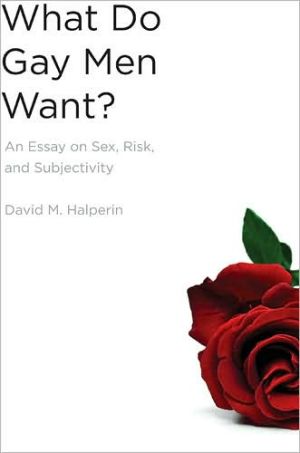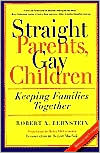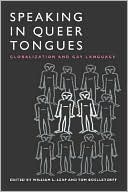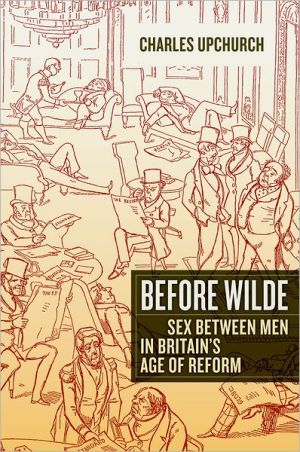What Do Gay Men Want?: An Essay on Sex, Risk, and Subjectivity
“Compelling, timely, and provocative. The writing is sleek and exhilarating. It doesn’t waste time telling us what it will do or what it has just done—it just does it.”\ —Don Kulick, Professor of Anthropology, New York University\ How we can talk about sex and risk in the age of barebacking—or condomless sex—without invoking the usual bogus and punitive clichés about gay men’s alleged low self-esteem, lack of self-control, and other psychological “deficits”? Are there queer alternatives to...
Search in google:
A crucial effort to understand gay men's relation to sex and risk without recourse to tainted psychological concepts
What Do Gay Men Want?\ An Essay on Sex, Risk, and Subjectivity \ \ By David M. Halperin \ THE UNIVERSITY OF MICHIGAN PRESS\ Copyright © 2007 David M. Halperin\ All right reserved.\ ISBN: 978-0-472-11622-5 \ \ \ Chapter One\ What do gay men want? \ According to a number of recent novels, gay men just want to be held. According to some current writing about HIV/AIDS prevention, gay men actually want to be killed. According to most critical work in queer studies-well, most critical work in queer studies has nothing to say about the subject.\ The silence of queer studies on the topic of gay male subjectivity-the inner life of male homosexuality, what it is that gay men want-is no accident. The Gay Liberation movement of the 1960s and 1970s may have had its ideological roots in a combination of Marxism and Freudianism, and it may have understood its struggles to be directed as much against psychic repression as political oppression, but the kind of lesbian and gay studies that emerged in Great Britain and North America during the 1980s was largely uninterested in exploring questions of lesbian and gay male subjectivity. That is because subjectivity at the time tended to be understood in terms of psychology, and psychology had long represented a tainted category for lesbians, gay men, and other sexual dissidents.\ For more than a century, any deviation from very strict standards of normative gender presentation and heterosexual behavior had been considered, and treated, as the sign of a psychological illness-as a symptom of a diseased state, variously described as "moral insanity," "sexual perversion," "personality disorder," "mental illness," or "maladjustment," but characterized in any case as a kind of abnormal psychology. Even as late as the 1970s and 1980s, many reputable psychiatrists and psychoanalysts continued to maintain in all seriousness that homosexuals were sick. And as recently as 1999, a prominent psychologist could speculate, in the pages of a scientific publication, that "homosexuality represents a deviation from normal development and is associated with other such deviations that may lead to mental illness." In the wake of more than a century of medical and forensic treatment of homosexuality as a psychiatric pathology or aberration, lesbians and gay men of the post-Stonewall era directed much political effort to undoing the presumption that there was something fundamentally wrong with us. In this context, it seemed necessary to close off the entire topic of gay subjectivity to respectable inquiry, so as to prevent gayness from ever again being understood as a sickness.\ In pursuit of that goal, the lesbian and gay movement has produced a remarkably plausible and persuasive new definition of homosexuality in political rather than psychological terms. To be gay, according to this new definition, is not to exhibit a queer subjectivity, but to belong to a social group. Homosexuality refers not to an individual abnormality but to a collective identity. Although on this view homosexuality may simply be a natural human variation, it has nevertheless been the object of social hostility, of intense and irrational prejudice, leading to widespread and unjustified discrimination against gay people. To be gay therefore is to be marked, through no fault of one's own, by the stigma that comes from persistent social rejection and exclusion. What gay people have in common, then, is not a psychological disorder but a social disqualification. We also share a long history of savage, even genocidal oppression, which gives us an immediate political claim to social tolerance, freedom from discrimination, and overall improvement in our life chances.\ By virtue of being defined in this way, as members of a stigmatized group, but as otherwise no different from "normal people," lesbians and gay men have acquired a collective identity equivalent to that of any ethnic or religious group that is socially marked by its perceived difference from regular folks. Once lesbians and gay men succeeded in convincing both straight people and ourselves to view us in this way, with help from the precedent set by earlier campaigns against social stigma (notably, the Black Power movement and various third-world struggles for decolonization), we were able to achieve a certain degree of public acceptance as well as assimilation into society at large. So the practice of foregrounding gay identity and backgrounding gay subjectivity turned out to have a political payoff that we could not afford to despise. And it has also saved us from the persistent specter of psychopathology. We are still, understandably, reluctant to abandon that political strategy, and we get nervous when anyone departs from it.\ * Another reason why many practitioners of lesbian and gay studies nowadays tend to avoid the topic of gay subjectivity is that they are still heavily influenced by the work of Michel Foucault, a French philosopher and historian who was also a gay man. In the first volume of his History of Sexuality, originally published in 1976 and translated into English in 1978, Foucault advanced a powerful critique of sexual liberation. He argued, unexpectedly but persuasively, that the struggle against psychic repression, far from liberating sexual desire and leading to an overthrow of the régime of the normal, sometimes actually results in new and more insidious ways of naturalizing and enforcing sexual normality. For implicit in the revolutionary program of sexual liberation are a lot of unexamined, supposedly self-evident, but quite loaded and highly normative assumptions about what sexuality is, how it shapes human nature, and which are the most proper, healthy ways of expressing it.\ In order to challenge those assumptions, Foucault elaborated a radically political approach to sexuality. He redefined sexuality as a necessary element internal to the functioning of the modern liberal state and its systems of power. Foucault's political understanding of sexuality emphasized the impersonal operation of discourses, institutions, and similar social practices, granting little salience to the workings of individual interiority and deliberately displacing rival approaches that located sexuality at the core of the human subject. With its emphasis on the social and political utility of sexuality for the governing of individuals, Foucault's startling take on sexuality proved to be well suited to the needs of gay and lesbian resistance in the 1980s, when the rise of the New Right and the emergence of the HIV/AIDS epidemic combined to devastate queer communities and to erase many of our hard-won social gains.\ Foucault also offered the only theoretical approach to sexuality sufficiently substantive and original to compete with psychoanalysis-and to afford a meaningful intellectual alternative to it within the field of sexuality studies. Since psychoanalysis had long participated in the pathologizing of homosexuality, especially in the United States, and since the re-pathologizing of homosexuality was precisely what lesbian/gay politics had to contend with during the onset of the HIV/AIDS pandemic, it is no wonder that so much early work in lesbian/gay studies and queer theory took its initial inspiration, and drew so many of its critical axioms, from Foucault.\ Another way of putting this point is to say that lesbians and gay men had lots of reasons independent of Foucault for not wanting to think about the distinctive properties of queer subjectivity. Given the long history of treating sexual differences not as benign variations but as diseases or abominations, it would be risky indeed to ascribe any particular subjective characteristics or practices to homosexuality, because any feature unique to the inner lives of lesbians or gay men would likely be interpreted as a symptom or expression of pathology. When Foucault declared in 1981 that "the entire art of life consists in killing off psychology" (L'art de vivre, c'est de tuer la psychologie), he was voicing an attitude common to many lesbians and gay men of his generation who, like him, had spent a lifetime struggling against their own sense of psychological deviance, while also trying to shrug off the unflattering judgments of psychological experts and to dodge the constant, perennial accusations of perversion, sickness, abnormality.\ The problem with killing off psychology, though, was that for more than a hundred years psychology, and subsequently psychoanalysis, had provided the chief means of access to the imagined truth of human subjectivity. Killing off psychology in such a context meant foreclosing all access to the category of gay subjectivity itself, bracketing it as an object of gay investigation, and thereby making it impossible to ask, much less to answer, the question, "What do gay men want?" That, indeed, was precisely the point: to make the world safe for lesbians and gay men by focusing on the politically acceptable category of gay identity and by shifting attention away from the disquieting and potentially discreditable details of gay subjectivity. The aim was to distract straight people from everything about gay culture that might make them feel uncomfortable with it, suspicious of it, or excluded from it, and to get them to sympathize instead with our political (and therefore less viscerally upsetting) demands for equal treatment, social recognition, and procedural justice. Those are the sorts of demands, after all, that are most likely to be found reasonable by people who don't have especially warm feelings for gay people but who can be moved to tolerate us, or at least not to mistreat us, when one appeals to their basic sense of fairness and decency. Foreclosing the question of gay subjectivity was a small price to pay for scuttling a psychological model of homosexual difference premised on sexual abnormality and replacing it with a political program grounded in a non-psychological notion of gayness as a quasi-ethnic social identity.\ A small price, then-but a necessary one? What if psychology were not the only means of access to the supposed truth of subjectivity? What if the psychic were not necessarily the royal road to knowledge of the internal workings of the gay subject? Even during the period of their ascendancy, psychology and psychoanalysis were shadowed by an alternate tradition, perhaps not a consistent tradition so much as a persistent impulse, visible conspicuously (though not exclusively) in the work of a number of gay male writers. In their different ways, Walter Pater, Oscar Wilde, André Gide, Marcel Proust, Jean Genet, and Roland Barthes all attempted to imagine and to represent human subjectivity without recourse to psychology. And as Foucault's later work makes clear, Foucault himself was hardly trying to impose a blackout on all inquiry into "the hermeneutics of the subject": that, after all, was the title he gave to his lectures at the Collège de France in the winter and spring of 1982. On the contrary, Foucault was challenging himself, and us, to find ways of approaching subjectivity that would not necessarily be routed through psychology or through the already familiar and increasingly trite conceptual categories of psychoanalysis.\ * To be sure, Foucault had little to say, even in those 1982 lectures, about what an anti-psychological hermeneutics of the subject might look like. In fact, he had little to say about any kind of interpretative or explanatory model of the subject. Despite the title he came up with for his course, Foucault decided to approach the relations between the subject and truth-his principal topic-via a study of the theory and the practice of the "care of the self" in Hellenistic and Roman philosophy some two thousand years earlier. Foucault chose to focus on that distant, transitional period in the history of Western thought precisely because, according to him, a hermeneutics of the subject in the modern sense was strikingly, tellingly absent from it. In other words, it was because the subject's relation to truth in the philosophical discourses of the time did not take the form of a psychological discipline of introspection and decipherment-of an actual "hermeneutics"-that Foucault decided to examine it so closely. In place of a modern science of the subject that treats the self as a locus of psychological depth, the site of an interiority which it is crucial to explore and to chart (so as to distinguish normal kinds of mental functioning from their perverted opposites), Foucault wanted to advance "an analytics of the forms of reflexivity ... that constitute the subject as such." Foucault, then, was concerned almost entirely with the techniques of self-fashioning-and with the different kinds of subjects that different kinds of relations to oneself could produce. He presented those techniques of self-fashioning as a historical alternative to, if not quite the antithesis of, the practices of self-analysis familiar to us from Christian and Freudian culture. He even acknowledged as much, emphasizing in his published summary of the course in the Annuaire of the Collège de France that the Greek and Roman "culture of the self" he had described in his lectures was "still very far away from what would [later] be a hermeneutics of the subject."\ Nonetheless, in a number of Foucault's passing remarks in his 1982 lectures on the differences between ancient self-knowledge, on the one hand, and Christian and Freudian self-exegesis, on the other, we can begin to glimpse the outlines of a possible non-disciplinary hermeneutics of the subject. They emerge from Foucault's strenuous efforts to define a historical form of the relations between the subject and truth that would offer an alternative to modern methods of mapping and analyzing psychic interiority and would represent a practice of self-knowledge opposed, or at least opposable, to more recent Christian and Freudian techniques. Foucault was at pains to recover and to describe a model of knowing the self that had been prominent in the past, that was distinct from "the sciences of the mind, psychology, the analysis of consciousness," and that did not lie at their origin. Over against "the objectification [l'objectivation] of the self in a true discourse," characteristic both of Christianity and psychology, the ancient "culture of the self" afforded a radically different possibility: "the subjectivation of a true discourse in a practice and exercise of oneself on oneself."\ Foucault argued that this non-exegetical mode of knowing the self, though largely neglected by modern philosophy and culture in the West, had never completely died out. Indeed, "a whole section of nineteenth-century thought can be reread as a difficult attempt, a series of difficult attempts, to reconstitute an ethics and an aesthetics of the self." In the interviews he gave to the gay press at about the same time as he was delivering those lectures, Foucault made it clear that he saw the promise of the lesbian and gay movement in a similar light. Queer politics was a way of killing off psychology and of reactivating an ethics of the self that would consist not in self-analysis, nor in adherence to norms of proper, healthy functioning, but in "an aesthetics of existence." Foucault found in certain modes of queer life new possibilities for self-fashioning and self-knowledge. Although those queer ways of life might be very different from the ancient practices of the self with which Foucault was concerned in his scholarly work, they resembled their ancient forebears insofar as they offered an alternative to the scientific and normative disciplines of the self favored by our post-Christian, post-Freudian culture. At least, that was the radical hope Foucault glimpsed in the lesbian and gay movement.\ * If we are to keep that hope alive, we will have to forge queer alternatives to the modern, scientific culture of the self and its psychological hermeneutics of the subject. Queer culture has in fact shown itself to be prolific in inventing concrete escape-routes from self-analysis, ranging from gay churches to gay bathhouses. And a number of gay male writers, as I mentioned, have already elaborated various anti-psychological approaches to representing the queer subject. So queer people have a multitude of both social and intellectual resources to draw on when it comes to figuring out how to have a subjectivity, and a sexual subjectivity in particular, without conceptualizing or experiencing it in terms of either psychology or psychoanalysis.\ (Continues...)\ \ \ \ \ Excerpted from What Do Gay Men Want? by David M. Halperin Copyright © 2007 by David M. Halperin. Excerpted by permission.\ All rights reserved. No part of this excerpt may be reproduced or reprinted without permission in writing from the publisher.\ Excerpts are provided by Dial-A-Book Inc. solely for the personal use of visitors to this web site. \ \
Contents WHAT DO GAY MEN WANT? An Essay on Sex, Risk, and Subjectivity....................1Notes....................111Acknowledgments....................155Appendix UNSAFE Why Gay Men Are Having Risky Sex Michael Warner....................157








